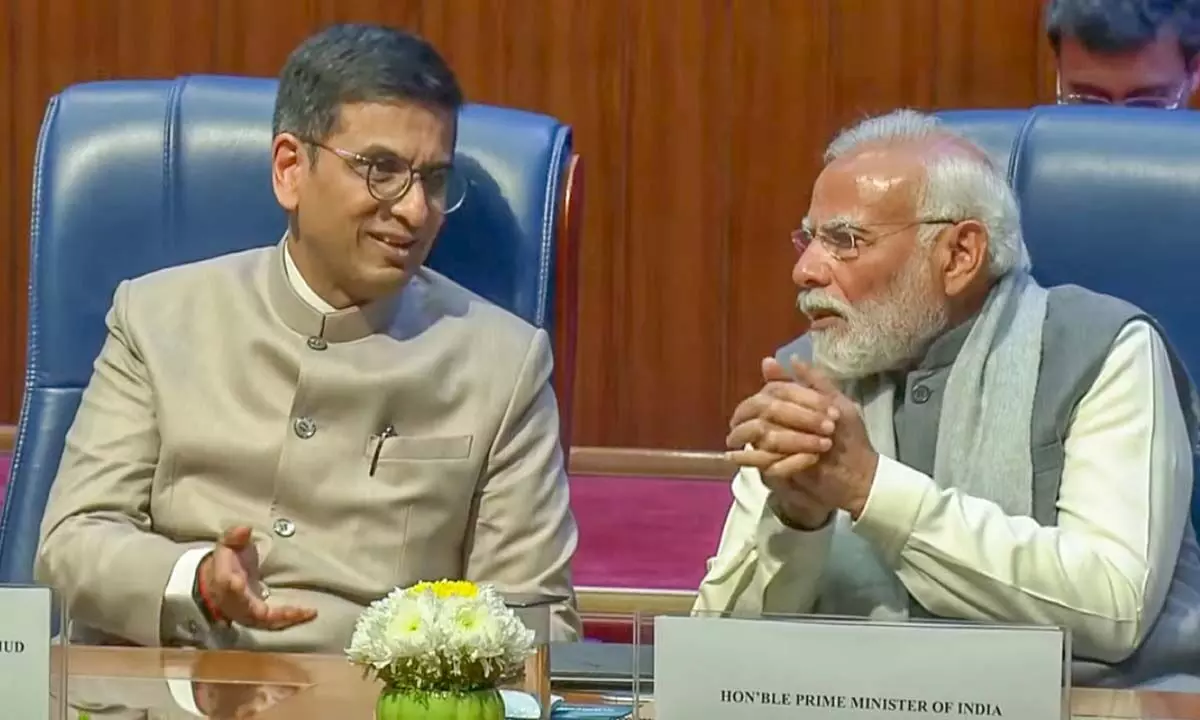Live
- All you need to know about PAN 2.0
- Akasa Air redefines travel experience with industry-first offerings
- MP: Residents stage protests against liquor shop in Indore
- Telugu Actor Shri Tej Booked for Alleged Cheating and False Promise of Marriage in Live-in Relationship
- Toyota Kirloskar Motor Celebrates 1 Lakh Urban Cruiser Hyryder on Indian Road
- MLS: New York City FC part ways with head coach Nick Cushing
- Delhi CM says Centre cutting AAP voters’ names from rolls, BJP hits back
- Hyderabad Metro Rail Phase-II Works to Begin in Old City in January 2025
- Odisha: 668 persons killed in human-elephant conflicts in last three years
- DEFENDER JOURNEYS: TO EMBARK ON ITS THIRD EDITION FROM NOVEMBER 2024
Just In
Ease of justice is the right of every citizen: PM Modi


Prime Minister Narendra Modi and Chief Justice of India Justice D.Y Chandrachud during the 75th year celebrations of the Supreme Court of India, in New Delhi on Sunday
Stressing that The Jan Vishwas Bill will reduce unnecessary burden on the judicial system in the future, Prime Minister Narendra Modi on Sunday said the government was modernising laws keeping in view the present context and in line with the best practices.
New Delhi: Stressing that The Jan Vishwas Bill will reduce unnecessary burden on the judicial system in the future, Prime Minister Narendra Modi on Sunday said the government was modernising laws keeping in view the present context and in line with the best practices. He stressed on easing the judicial system for the benefit of common man.
Addressing the 75th anniversary celebrations of the Supreme Court, Modi said, “An empowered judicial system is a part of Viksit Bharat. The government is working continuously and taking many decisions to form a trusted judicial system. The Jan Vishwas Bill is a step in this direction. In the future, this will reduce the unnecessary burden on the judicial system,” he said.
Further, the Prime Minister said that ease of living, ease of doing business, travel, communication and ease of justice as the government’s top priorities. “Ease of justice is the right of every Indian citizen and the Supreme Court of India, its medium,” Modi said.
“Laws made today will brighten the future of India. With changes happening globally, the world’s eyes are set on India. As the world’s trust is growing stronger in India, in such times, it is important for India to take advantage of every opportunity given to us,” Modi said. He stressed the government’s prioritization towards making the Supreme Court accessible to the remotest parts and mentioned that the fund allocation for the third phase of the E-Courts Mission Project has been increased four times than the second phase.
The Prime Minister launched citizen-centric information and technology initiatives that include Digital Supreme Court Reports (Digi SCR), Digital Courts 2.0 and the new website of the Supreme Court.
The Digi SCR will make the apex court’s judgments available to the citizens of the country free of cost and in electronic format. All 519 volumes of the Supreme Court reports since 1950, covering 36,308 cases, shall be available in a digital format, bookmarked, user-friendly, and with open access in Digi SCR.
Recalling his suggestions to draft laws in simple language for better understanding, Modi suggested drafting court judgements and orders should also be in simple language.
Underscoring the essence of Indian values and modernity in our legal framework, Modi emphasized the need for the laws to reflect both Indian ethos and contemporary practices. “The convergence of Indian values and modernity is equally essential in our legal statutes. The government is actively working on modernizing laws to align with the present situation and best practices,” he said.
Addressing the event, law minister Arjun Ram Meghwal said that the government was working on mission mode to improve the digital infrastructure of the judiciary and noted that the Supreme Court has become a global leader in virtual hearings. Top courts of over 40 countries refer to verdicts of the Supreme Court of India while delivering their judgments, he said.

© 2024 Hyderabad Media House Limited/The Hans India. All rights reserved. Powered by hocalwire.com






